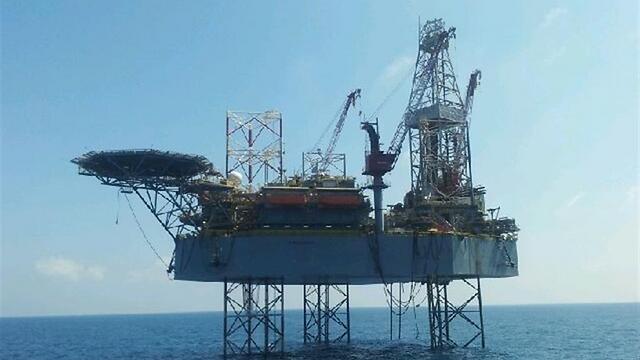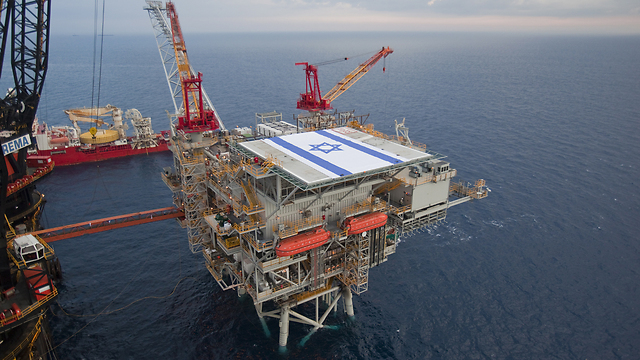
Gas field near Ashdod
צילום: רויטרס
Egypt says Zohr gas find will not undermine talks on imports from Israel
Minister: Deals with Israel not endangered, Zohr gas will flow to domestic market, after Israeli energy stocks fell earlier in the week.
The discovery of the Zohr natural gas field off Egypt will not undermine private-sector negotiations about buying gas from Israel, Egypt's petroleum minister said, playing down fears that potential deals could be under threat.
Italian energy company Eni announced on Sunday that it had found an estimated 30 trillion cubic feet (tcf) of gas in the Zohr field, making it the biggest discovery in the Mediterranean and the world's 20th largest.
The find raised concerns in Israel's gas industry that its Leviathan field would lose a deal to supply gas to a liquefied natural gas (LNG) plant in Egypt.
"Any negotiations between private companies in Egypt and in the eastern Mediterranean, and by this I mean Israel and Cyprus, will not stop," Petroleum Minister Sherif Ismail told Reuters in an interview.
"These negotiations and initial agreements are ongoing."
Private companies will require government approval to import gas from Israel, the minister said.
Ismail's comments may improve sentiment on the Israeli stock market where leading energy companies on Monday suffered losses of more than 4.5 billion shekels ($1.1 billion) after news of the Zohr discovery.
Despite the minister's comments, Western oil companies operating in Egypt negotiating gas import deals with Israeli counterparts will have to decide for themselves whether recent finds in Egypt alter the equation.
"We do not object to the plans of private companies (which are) operating in Egypt and looking to import natural gas from eastern Mediterranean countries," the minister said.
For Egypt, the Zohr field offers hope in the country's battle with chronic, politically sensitive energy shortages.
Egypt used to export gas to Israel and elsewhere but has become a net importer over the last few years because of booming consumption and depleted natural gas output.
State-owned EGAS has been forced to ration gas supplies to industry, crippling production and hampering Egypt's economic recovery.
Blackouts deepened discontent with Islamist President Mohamed Mursi before the army toppled him in 2013.
Gas produced from the Zohr field will flow to Egypt, including Eni's share, Ismail said, suggesting Cairo has no export plans from Zohr.
Eni will hold a 35 percent share of Zohr's reserves, with the rest claimed by the state, the Ministry of Petroleum said this week.
"The priority is for the domestic market," Ismail said.
Around 75 percent of the 30 tcf of gas in the new field is likely recoverable given it's "good quality" and this would bring Egypt's total natural gas reserves to an estimated 90 tcf, the minister said.
Once developed it is expected to produce between 2.5 and 3 billion cubic feet of gas per day, Ismail said.
Eni is expected to deliver a development plan by the end of October detailing the number of wells it will dig, and production will likely begin at the start of 2018, the minister said.
Analysts say this timeline is ambitious and that at least in the short run Egypt may still look to Israel's Leviathan to fill its natural gas needs.
The price paid to Eni to purchase the field's gas for domestic use is still under negotiation.
"We have not yet agreed with Eni over the price of the gas...but the important thing is it's a number appropriate for both parties...It's not a condition that it be the same number agreed upon in other deals," the minister said.
In July, Egypt raised the prices it pays Eni and Edison for the gas they produce in the country, a move intended to encourage needed investment in energy.
The petroleum minister said previously that Egypt is looking to be energy self sufficient by 2020. The newest discovery does not mean this will be achieved any sooner, he said.
When asked about the prospect of exporting gas in the future, the minister said: "We have to be realistic...we need to cover the needs of the domestic market in full."
The prospect of relaunching exports depends on other discoveries and production levels from other, smaller fields expected to come online in the next few years, he said.
The Zohr discovery also makes it more likely that LNG plants which have suspended operations in recent years return to service.
"Of course the LNG plants will go back to operating in the coming period, as we have a plan to exploit the gas surpluses of Mediterranean basin countries for use at these plants," the minister said, adding he hopes to make Egypt a global gas hub.
"It's very likely that the new discovery will attract new international companies to work in the area," he said.












